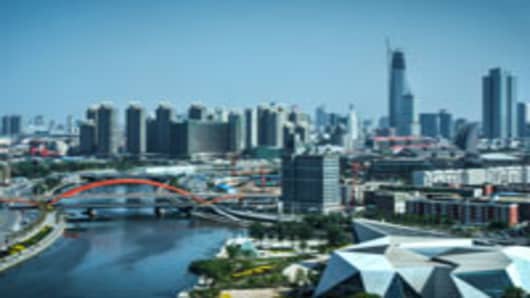A city run by one of China's incoming political leaders that has billed itself as a future international financial center is instead becoming the country's internet censorship capital.
Tianjin, whose Communist party secretary Zhang Gaoli is one of the seven men most likely to get a seat on the new politburo standing committee due to be unveiled at the 18th party congress starting on Thursday, is developing a replica of Manhattan to which it aims to attract global banks.
But local government officials explaining a mock-up of Yujiapu, the new district on the site of a former fishing village, last week said they did not know of any foreign bank that had committed to coming. Meanwhile, some of China's leading internet firms are relocating their censorship operations to Tianjin as they battle soaring labor costs.
Tianjin's tale illustrates China's rapidly changing economic landscape but also puts a question mark over the reform and economic policy credentials of the country's incoming leaders.
(Read More: China's New Leaders—the Lineup)
Mr. Zhang has been characterized as a financial reformer, mainly because he served in the southern province of Guangdong, known for piloting economic reforms. Two people familiar with the party's discussions over leadership posts said Mr. Zhang could receive an important economic portfolio in the team that will rule China for the coming decade.
But while Tianjin, which he has run since 2007, has failed to boost Mr. Zhang's credentials, it has become the first choice for internet companies as they follow textile, toy, and electronics manufacturers away from larger cities in pursuit of lower wages.
Youku Tudou, China's largest online video company by revenue, is considering moving its censorship operations from Beijing 170km to the coastal city of 10m people.
"We're talking 300 to 400 people, and there's no reason these people need to be in Beijing or Shanghai where salaries are going through the roof," said a person familiar with the company's plans.
The Chinese government requires the private companies that run internet services such as search engines and social media to censor. Censorship has intensified ahead of the party congress in an effort to muzzle discussion of the party's internal power struggle and corruption.
The censorship departments of Sina Weibo, China's leading Twitter equivalent, and the online video website Sohu have already been moved to Tianjin.
When users of Sina Weibo post content deemed offensive or subversive, a virtual "little secretary" deletes their posts, blocks searches for keywords or admonishes them to back off.
"Censorship is a low-end, labor-intensive kind of work, so these operations are easier to relocate to lower-wage locations," said Li Zhi at Analysys, a Beijing-based internet research firm.
According to jobui.com, a Chinese job search website, the average monthly salary for internet censors in Beijing is Rmb4,081 ($653), in Shenzhen Rmb3,714, and in Tianjin Rmb2,998.


